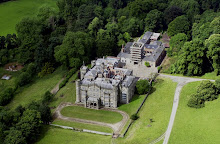
Neil Avery born 1956 in Staffordshire is an entrepreneur, designer and conservation specialist. Son of a successful interior designer, his fathers practice was based in Birmingham and part of a minimalist post-war design movement.
Avery left Wolverhampton Art College in the seventies having specialised in sculpture and later product design with a particular passion for motorcycle styling. He began a career at NVT (Norton Villiers Triumph) motorcycle works in Wolverhampton being attached to the research and later the experimental department; working on the Commando and later the “Wolf” project.
Due to the crisis in the British motorcycle industry NVT closed down and in the mid 70’s Avery moved to the construction industry working as a joiner and designer for a shop-fitting and display company specialising in bespoke joinery and commercial interior design.
In 1980 Avery set up his own specialist joinery and Design Company specialising in interior remodelling of large houses and later on embarking upon the acquisition and conversion of barns and cottages in Shropshire and Staffordshire countryside working closely with Architects and Artisans alike.
During the late 80’s The Neil Avery Group operated a midland-wide residential and commercial property development company which focussed on the conversion and renovation of listed buildings, later developing an initiative towards small sustainable new village communities and taking inspiration from the designs and realisations of such inter-war communities as Bourneville in Birmingham and Port Sunlight on Merseyside.
The Thatcher-Lawson recession of 1991 led to a crisis in the UK construction and development industries and Avery decided to wind down operations in the UK in favour of a more aesthetic lifestyle, experimenting with concepts of sustainable eco-communities and in particular voluntary work with small communities in north western India implementing water management sanitation and purification systems.
During the upturn in the UK economy of the mid 1990’s Avery returned to the UK to concentrate once again on the conservation and renovation of listed buildings and accumulated by acquisition a portfolio of ruined monuments the most noteworthy of which were Patshull Hall in Staffordshire and Apley Hall in Shropshire.
Apley later became Avery’s family home office and workshop for experimental design-work. In 2003 Avery sold his interests in Apley and Patshull to concentrate on the acquisition and renovation of chateaux in the south of France and restoration projects in Eastern Europe.

